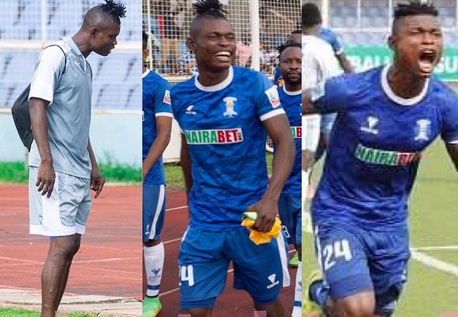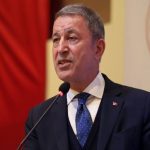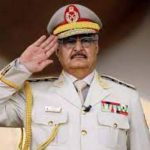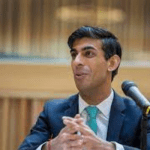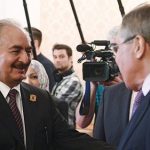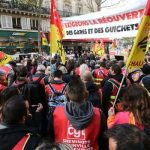France said on Thursday it was reviewing its position on the Libyan conflict and for the first time openly called for a united national army that included eastern militia commander Khalifa Haftar to battle Islamist militants.
In the previous government, the Foreign Ministry openly supported the U.N.-backed Libyan government of Prime Minister Fayez Seraj, while the Defence Ministry worked closely with Haftar, who has waged a campaign against Islamists in eastern Libya but resisted a rapprochement with Seraj.
Diplomats had told Reuters that they had expected a clarification once the new president, Emmanuel Macron, took office. The previous defence minister, Jean-Yves Le Drian, is now foreign minister.
“Libya needs to build a national army under civilian control with the participation of all the forces that fight terrorism across the country, including those of General Haftar,” Foreign Ministry spokesman Romain Nadal told reporters in a daily briefing, making no mention of Seraj.
“In contact with our European partners and neighbouring countries, France will study ways of reinforcing our political and security activity to help restore Libyan institutions and an army capable of defeating the terrorists.”
France had never publicly urged a role for Haftar before.
The new president, who travels to Mali on Friday to meet French troops and hold talks with President Ibrahim Boubacar Keita, vowed during the election campaign to put the fight against Islamist militants at the top of his security priorities.
Haftar’s self-styled Libyan National Army (LNA) has become the dominant force in eastern Libya over the past three years, though it continues to face armed resistance in Benghazi and other regions, and to take heavy losses.
Haftar and Seraj ended a year of deadlock by holding talks in Abu Dhabi this month, and appeared at ease – but it is unclear if either man will help to reconcile a complex array of factions on both sides of Libya’s divide.
France took a leading role in the NATO air campaign that helped rebels topple Libyan leader Muammar Gaddafi in 2011, but his demise tipped the country into years of chaos.
Paris has thousands of soldiers positioned across West Africa, some of them about 60 km from Libya’s southern desert border, as part of its Barkhane counter-terrorism force.
Three members of French special forces were killed in a helicopter accident during an intelligence-gathering mission with Haftar’s forces last year.
France said on Thursday it was reviewing its position on the Libyan conflict and for the first time openly called for a united national army that included eastern militia commander Khalifa Haftar to battle Islamist militants.
In the previous government, the Foreign Ministry openly supported the U.N.-backed Libyan government of Prime Minister Fayez Seraj, while the Defence Ministry worked closely with Haftar, who has waged a campaign against Islamists in eastern Libya but resisted a rapprochement with Seraj.
Diplomats had told Reuters that they had expected a clarification once the new president, Emmanuel Macron, took office. The previous defence minister, Jean-Yves Le Drian, is now foreign minister.
“Libya needs to build a national army under civilian control with the participation of all the forces that fight terrorism across the country, including those of General Haftar,” Foreign Ministry spokesman Romain Nadal told reporters in a daily briefing, making no mention of Seraj.
“In contact with our European partners and neighbouring countries, France will study ways of reinforcing our political and security activity to help restore Libyan institutions and an army capable of defeating the terrorists.”
France had never publicly urged a role for Haftar before.
The new president, who travels to Mali on Friday to meet French troops and hold talks with President Ibrahim Boubacar Keita, vowed during the election campaign to put the fight against Islamist militants at the top of his security priorities.
Haftar’s self-styled Libyan National Army (LNA) has become the dominant force in eastern Libya over the past three years, though it continues to face armed resistance in Benghazi and other regions, and to take heavy losses.
Haftar and Seraj ended a year of deadlock by holding talks in Abu Dhabi this month, and appeared at ease – but it is unclear if either man will help to reconcile a complex array of factions on both sides of Libya’s divide.
France took a leading role in the NATO air campaign that helped rebels topple Libyan leader Muammar Gaddafi in 2011, but his demise tipped the country into years of chaos.
Paris has thousands of soldiers positioned across West Africa, some of them about 60 km from Libya’s southern desert border, as part of its Barkhane counter-terrorism force.
Three members of French special forces were killed in a helicopter accident during an intelligence-gathering mission with Haftar’s forces last year.
France said on Thursday it was reviewing its position on the Libyan conflict and for the first time openly called for a united national army that included eastern militia commander Khalifa Haftar to battle Islamist militants.
In the previous government, the Foreign Ministry openly supported the U.N.-backed Libyan government of Prime Minister Fayez Seraj, while the Defence Ministry worked closely with Haftar, who has waged a campaign against Islamists in eastern Libya but resisted a rapprochement with Seraj.
Diplomats had told Reuters that they had expected a clarification once the new president, Emmanuel Macron, took office. The previous defence minister, Jean-Yves Le Drian, is now foreign minister.
“Libya needs to build a national army under civilian control with the participation of all the forces that fight terrorism across the country, including those of General Haftar,” Foreign Ministry spokesman Romain Nadal told reporters in a daily briefing, making no mention of Seraj.
“In contact with our European partners and neighbouring countries, France will study ways of reinforcing our political and security activity to help restore Libyan institutions and an army capable of defeating the terrorists.”
France had never publicly urged a role for Haftar before.
The new president, who travels to Mali on Friday to meet French troops and hold talks with President Ibrahim Boubacar Keita, vowed during the election campaign to put the fight against Islamist militants at the top of his security priorities.
Haftar’s self-styled Libyan National Army (LNA) has become the dominant force in eastern Libya over the past three years, though it continues to face armed resistance in Benghazi and other regions, and to take heavy losses.
Haftar and Seraj ended a year of deadlock by holding talks in Abu Dhabi this month, and appeared at ease – but it is unclear if either man will help to reconcile a complex array of factions on both sides of Libya’s divide.
France took a leading role in the NATO air campaign that helped rebels topple Libyan leader Muammar Gaddafi in 2011, but his demise tipped the country into years of chaos.
Paris has thousands of soldiers positioned across West Africa, some of them about 60 km from Libya’s southern desert border, as part of its Barkhane counter-terrorism force.
Three members of French special forces were killed in a helicopter accident during an intelligence-gathering mission with Haftar’s forces last year.
France said on Thursday it was reviewing its position on the Libyan conflict and for the first time openly called for a united national army that included eastern militia commander Khalifa Haftar to battle Islamist militants.
In the previous government, the Foreign Ministry openly supported the U.N.-backed Libyan government of Prime Minister Fayez Seraj, while the Defence Ministry worked closely with Haftar, who has waged a campaign against Islamists in eastern Libya but resisted a rapprochement with Seraj.
Diplomats had told Reuters that they had expected a clarification once the new president, Emmanuel Macron, took office. The previous defence minister, Jean-Yves Le Drian, is now foreign minister.
“Libya needs to build a national army under civilian control with the participation of all the forces that fight terrorism across the country, including those of General Haftar,” Foreign Ministry spokesman Romain Nadal told reporters in a daily briefing, making no mention of Seraj.
“In contact with our European partners and neighbouring countries, France will study ways of reinforcing our political and security activity to help restore Libyan institutions and an army capable of defeating the terrorists.”
France had never publicly urged a role for Haftar before.
The new president, who travels to Mali on Friday to meet French troops and hold talks with President Ibrahim Boubacar Keita, vowed during the election campaign to put the fight against Islamist militants at the top of his security priorities.
Haftar’s self-styled Libyan National Army (LNA) has become the dominant force in eastern Libya over the past three years, though it continues to face armed resistance in Benghazi and other regions, and to take heavy losses.
Haftar and Seraj ended a year of deadlock by holding talks in Abu Dhabi this month, and appeared at ease – but it is unclear if either man will help to reconcile a complex array of factions on both sides of Libya’s divide.
France took a leading role in the NATO air campaign that helped rebels topple Libyan leader Muammar Gaddafi in 2011, but his demise tipped the country into years of chaos.
Paris has thousands of soldiers positioned across West Africa, some of them about 60 km from Libya’s southern desert border, as part of its Barkhane counter-terrorism force.
Three members of French special forces were killed in a helicopter accident during an intelligence-gathering mission with Haftar’s forces last year.
France said on Thursday it was reviewing its position on the Libyan conflict and for the first time openly called for a united national army that included eastern militia commander Khalifa Haftar to battle Islamist militants.
In the previous government, the Foreign Ministry openly supported the U.N.-backed Libyan government of Prime Minister Fayez Seraj, while the Defence Ministry worked closely with Haftar, who has waged a campaign against Islamists in eastern Libya but resisted a rapprochement with Seraj.
Diplomats had told Reuters that they had expected a clarification once the new president, Emmanuel Macron, took office. The previous defence minister, Jean-Yves Le Drian, is now foreign minister.
“Libya needs to build a national army under civilian control with the participation of all the forces that fight terrorism across the country, including those of General Haftar,” Foreign Ministry spokesman Romain Nadal told reporters in a daily briefing, making no mention of Seraj.
“In contact with our European partners and neighbouring countries, France will study ways of reinforcing our political and security activity to help restore Libyan institutions and an army capable of defeating the terrorists.”
France had never publicly urged a role for Haftar before.
The new president, who travels to Mali on Friday to meet French troops and hold talks with President Ibrahim Boubacar Keita, vowed during the election campaign to put the fight against Islamist militants at the top of his security priorities.
Haftar’s self-styled Libyan National Army (LNA) has become the dominant force in eastern Libya over the past three years, though it continues to face armed resistance in Benghazi and other regions, and to take heavy losses.
Haftar and Seraj ended a year of deadlock by holding talks in Abu Dhabi this month, and appeared at ease – but it is unclear if either man will help to reconcile a complex array of factions on both sides of Libya’s divide.
France took a leading role in the NATO air campaign that helped rebels topple Libyan leader Muammar Gaddafi in 2011, but his demise tipped the country into years of chaos.
Paris has thousands of soldiers positioned across West Africa, some of them about 60 km from Libya’s southern desert border, as part of its Barkhane counter-terrorism force.
Three members of French special forces were killed in a helicopter accident during an intelligence-gathering mission with Haftar’s forces last year.
France said on Thursday it was reviewing its position on the Libyan conflict and for the first time openly called for a united national army that included eastern militia commander Khalifa Haftar to battle Islamist militants.
In the previous government, the Foreign Ministry openly supported the U.N.-backed Libyan government of Prime Minister Fayez Seraj, while the Defence Ministry worked closely with Haftar, who has waged a campaign against Islamists in eastern Libya but resisted a rapprochement with Seraj.
Diplomats had told Reuters that they had expected a clarification once the new president, Emmanuel Macron, took office. The previous defence minister, Jean-Yves Le Drian, is now foreign minister.
“Libya needs to build a national army under civilian control with the participation of all the forces that fight terrorism across the country, including those of General Haftar,” Foreign Ministry spokesman Romain Nadal told reporters in a daily briefing, making no mention of Seraj.
“In contact with our European partners and neighbouring countries, France will study ways of reinforcing our political and security activity to help restore Libyan institutions and an army capable of defeating the terrorists.”
France had never publicly urged a role for Haftar before.
The new president, who travels to Mali on Friday to meet French troops and hold talks with President Ibrahim Boubacar Keita, vowed during the election campaign to put the fight against Islamist militants at the top of his security priorities.
Haftar’s self-styled Libyan National Army (LNA) has become the dominant force in eastern Libya over the past three years, though it continues to face armed resistance in Benghazi and other regions, and to take heavy losses.
Haftar and Seraj ended a year of deadlock by holding talks in Abu Dhabi this month, and appeared at ease – but it is unclear if either man will help to reconcile a complex array of factions on both sides of Libya’s divide.
France took a leading role in the NATO air campaign that helped rebels topple Libyan leader Muammar Gaddafi in 2011, but his demise tipped the country into years of chaos.
Paris has thousands of soldiers positioned across West Africa, some of them about 60 km from Libya’s southern desert border, as part of its Barkhane counter-terrorism force.
Three members of French special forces were killed in a helicopter accident during an intelligence-gathering mission with Haftar’s forces last year.
France said on Thursday it was reviewing its position on the Libyan conflict and for the first time openly called for a united national army that included eastern militia commander Khalifa Haftar to battle Islamist militants.
In the previous government, the Foreign Ministry openly supported the U.N.-backed Libyan government of Prime Minister Fayez Seraj, while the Defence Ministry worked closely with Haftar, who has waged a campaign against Islamists in eastern Libya but resisted a rapprochement with Seraj.
Diplomats had told Reuters that they had expected a clarification once the new president, Emmanuel Macron, took office. The previous defence minister, Jean-Yves Le Drian, is now foreign minister.
“Libya needs to build a national army under civilian control with the participation of all the forces that fight terrorism across the country, including those of General Haftar,” Foreign Ministry spokesman Romain Nadal told reporters in a daily briefing, making no mention of Seraj.
“In contact with our European partners and neighbouring countries, France will study ways of reinforcing our political and security activity to help restore Libyan institutions and an army capable of defeating the terrorists.”
France had never publicly urged a role for Haftar before.
The new president, who travels to Mali on Friday to meet French troops and hold talks with President Ibrahim Boubacar Keita, vowed during the election campaign to put the fight against Islamist militants at the top of his security priorities.
Haftar’s self-styled Libyan National Army (LNA) has become the dominant force in eastern Libya over the past three years, though it continues to face armed resistance in Benghazi and other regions, and to take heavy losses.
Haftar and Seraj ended a year of deadlock by holding talks in Abu Dhabi this month, and appeared at ease – but it is unclear if either man will help to reconcile a complex array of factions on both sides of Libya’s divide.
France took a leading role in the NATO air campaign that helped rebels topple Libyan leader Muammar Gaddafi in 2011, but his demise tipped the country into years of chaos.
Paris has thousands of soldiers positioned across West Africa, some of them about 60 km from Libya’s southern desert border, as part of its Barkhane counter-terrorism force.
Three members of French special forces were killed in a helicopter accident during an intelligence-gathering mission with Haftar’s forces last year.
France said on Thursday it was reviewing its position on the Libyan conflict and for the first time openly called for a united national army that included eastern militia commander Khalifa Haftar to battle Islamist militants.
In the previous government, the Foreign Ministry openly supported the U.N.-backed Libyan government of Prime Minister Fayez Seraj, while the Defence Ministry worked closely with Haftar, who has waged a campaign against Islamists in eastern Libya but resisted a rapprochement with Seraj.
Diplomats had told Reuters that they had expected a clarification once the new president, Emmanuel Macron, took office. The previous defence minister, Jean-Yves Le Drian, is now foreign minister.
“Libya needs to build a national army under civilian control with the participation of all the forces that fight terrorism across the country, including those of General Haftar,” Foreign Ministry spokesman Romain Nadal told reporters in a daily briefing, making no mention of Seraj.
“In contact with our European partners and neighbouring countries, France will study ways of reinforcing our political and security activity to help restore Libyan institutions and an army capable of defeating the terrorists.”
France had never publicly urged a role for Haftar before.
The new president, who travels to Mali on Friday to meet French troops and hold talks with President Ibrahim Boubacar Keita, vowed during the election campaign to put the fight against Islamist militants at the top of his security priorities.
Haftar’s self-styled Libyan National Army (LNA) has become the dominant force in eastern Libya over the past three years, though it continues to face armed resistance in Benghazi and other regions, and to take heavy losses.
Haftar and Seraj ended a year of deadlock by holding talks in Abu Dhabi this month, and appeared at ease – but it is unclear if either man will help to reconcile a complex array of factions on both sides of Libya’s divide.
France took a leading role in the NATO air campaign that helped rebels topple Libyan leader Muammar Gaddafi in 2011, but his demise tipped the country into years of chaos.
Paris has thousands of soldiers positioned across West Africa, some of them about 60 km from Libya’s southern desert border, as part of its Barkhane counter-terrorism force.
Three members of French special forces were killed in a helicopter accident during an intelligence-gathering mission with Haftar’s forces last year.

